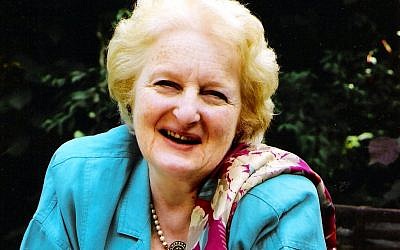OPINION: It’s time to reform Britain’s dysfunctional asylum system
There is a desperate need for new ideas on how to create a system that works effectively and enjoys public consent, writes Baroness Rabbi Julia Neuberger
Almost everyone agrees that the UK’s asylum system is broken. It is expensive, ineffective, and harmful.
There is a desperate need for new ideas on how to create a system that works effectively and enjoys public consent.
Taking up this challenge over the past two years, I joined the Commission on the Integration of Refugees to undertake the most significant and detailed exploration of the UK asylum system in a generation.
Joining me were 21 other Commissioners, and included other British Jews such as the Chair, Dr Ed Kessler founder of the Woolf Institute, Lord Alex Carlile, former Independent Reviewer of Terrorism Legislation and Janice Lopatkin, UK Programme Director of World Jewish Relief who established the successful refugee employment programme The Specialist Training and Employment Programme (STEP).
Alongside other Commissioners, including refugees, we have diverse expertise and varied political perspectives and our work has shown that it is possible to find solutions and to build political consensus around them.
There have until now been few opportunities for people like us – with ostensibly incompatible views – to come together, listen to each other’s perspectives and experiences, and try to articulate a shared agenda. We all signed up to the Commission in the full knowledge that we disagree with several of our fellow Commissioners.

But we are all committed to envisioning a refugee and asylum system that works for a society where everybody – including refugees and asylum seekers– feels welcome and part of strong, cohesive communities. Only through building consensus across experiential and political divides will we be able to find practical solutions to create a better system; better for refugees and better for communities.
But I have another reason for being part of this. My mother came to this country as a refugee from Nazi Germany in 1937. She came as a domestic servant, one of the few ways to get here relatively easily as a young woman. She was 22. She worked for the amazing Dobbs family, and then they paid for her education. She did not stay to complete it- at LSE- because by then Kristallnacht had taken place and her much younger brother’s teacher had been in touch with her to say she must get her brother out of Germany.
She got my uncle out and ultimately her parents too, thanks to wonderful non Jewish friends, thanks to the inestimable consul Robert Smallbones, in Frankfurt, and his deputy Arthur Dowden who signed my grandparents’ papers in late 1939. They were also helped by my maternal grandmother, who chaired the welfare Committee of the Refugee Committee at Woburn House, and who had herself arrived from Germany, though not as a refugee but a new bride, before World War I.
My father worked to help refugee children before the war, at a school called Stoatley Rough set up by the formidable refugee Dr Hilde Lion, and he also carried out various tasks for the refugee committee before volunteering for the army in 1939. So the refugee experience is personal to me.
My mother was allowed to work, and made firm friends with colleagues and indeed her bosses. She also integrated into a very mixed group of friends, mostly left wing, some Jewish but most not.
Despite retaining a strong German accent all her life, she was given the help and the friendship- and the encouragement- to integrate and become part of British society. She was a proud Brit. Her experience is one we should model now, for a new generation of asylum seekers coming to our shores, who have much to give.
My father worked to help refugee children before the war, at a school called Stoatley Rough set up by the formidable refugee Dr Hilde Lion
The Commission was based on six pillars of research, including evidence from more than 1,250 individuals and organisations, the Commission has been able to achieve full or near-consensus around 16 recommendations to propose an integration-based asylum system that can deliver benefits not only for refugees but for wider society – from contributing to tackling the housing crisis and homelessness to promoting economic flourishing.
The recommendations are underpinned by a financial model developed by the London School of Economics, which found that they would yield a net economic benefit to the country of at least £1.2 billion by year five of their implementation.
There are two core elements to our proposals. The first is that our 16 recommendations are designed to be mutually reinforcing and their impact will be greater if they are taken together. A coherent and holistic approach is also necessary to unlock the economic benefits projected by the LSE.
The three main conditions for this are that the government needs to meet its target to process asylum applications within six months, and that asylum seekers receive free English language provision from day one and access to employment support from six months. We are also calling for asylum seekers to be able to work from six months.
The second is localisation of decisions, budget and delivery. At the heart of our recommendations is a new settlement for refugees delivered through ‘local integration partnerships’.
These would put devolved governments, regional and local authorities, and communities in control in order to create the best possible conditions for integration. The national government would play a coordinating role, including setting overall numbers.
There is an abundance of good practice available to guide this shift towards localisation, including from the devolved national governments of Scotland and Wales, but also from other local authorities in the UK, from other countries, and from the success of initiatives including the community sponsorship and Ukrainian refugee settlement programmes.
The solutions we are proposing would not only be more effective than the current system, but cheaper, more coherent, more in tune with the values of compassion and fairness that so many people manifest towards asylum seekers, and capable of delivering long-term economic benefits and positive social outcomes both for refugees and wider British society.

Thank you for helping to make Jewish News the leading source of news and opinion for the UK Jewish community. Today we're asking for your invaluable help to continue putting our community first in everything we do.
For as little as £5 a month you can help sustain the vital work we do in celebrating and standing up for Jewish life in Britain.
Jewish News holds our community together and keeps us connected. Like a synagogue, it’s where people turn to feel part of something bigger. It also proudly shows the rest of Britain the vibrancy and rich culture of modern Jewish life.
You can make a quick and easy one-off or monthly contribution of £5, £10, £20 or any other sum you’re comfortable with.
100% of your donation will help us continue celebrating our community, in all its dynamic diversity...
Engaging
Being a community platform means so much more than producing a newspaper and website. One of our proudest roles is media partnering with our invaluable charities to amplify the outstanding work they do to help us all.
Celebrating
There’s no shortage of oys in the world but Jewish News takes every opportunity to celebrate the joys too, through projects like Night of Heroes, 40 Under 40 and other compelling countdowns that make the community kvell with pride.
Pioneering
In the first collaboration between media outlets from different faiths, Jewish News worked with British Muslim TV and Church Times to produce a list of young activists leading the way on interfaith understanding.
Campaigning
Royal Mail issued a stamp honouring Holocaust hero Sir Nicholas Winton after a Jewish News campaign attracted more than 100,000 backers. Jewish Newsalso produces special editions of the paper highlighting pressing issues including mental health and Holocaust remembrance.
Easy access
In an age when news is readily accessible, Jewish News provides high-quality content free online and offline, removing any financial barriers to connecting people.
Voice of our community to wider society
The Jewish News team regularly appears on TV, radio and on the pages of the national press to comment on stories about the Jewish community. Easy access to the paper on the streets of London also means Jewish News provides an invaluable window into the community for the country at large.
We hope you agree all this is worth preserving.






















